Budgeting Report: Comparing Traditional and Zero-Based Approaches
VerifiedAdded on 2023/01/18
|5
|629
|86
Report
AI Summary
This report provides a comparative analysis of traditional and zero-based budgeting methods. It begins by defining and explaining the core concepts of both approaches, including how traditional budgeting relies on previous periods and zero-based budgeting starts from scratch. The report then delves into the advantages and disadvantages of each method, highlighting how zero-based budgeting can improve resource planning and organizational collaboration. It also emphasizes the importance of justifying expenses in zero-based budgeting, unlike the line-item focus of traditional budgeting. The report concludes by advocating for the benefits of zero-based budgeting in terms of responsiveness and clarity. The report uses references to support its claims.
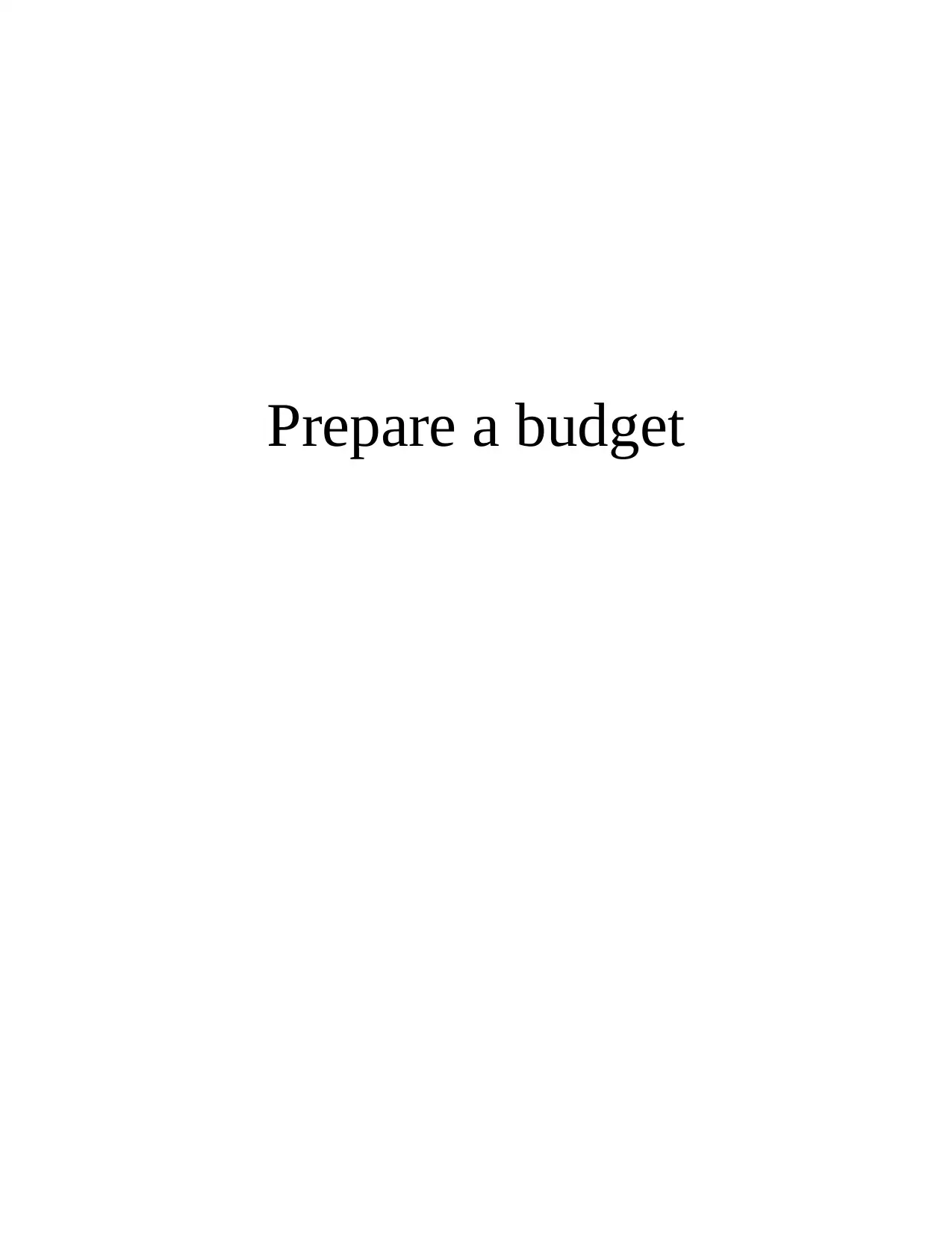
Prepare a budget
Paraphrase This Document
Need a fresh take? Get an instant paraphrase of this document with our AI Paraphraser
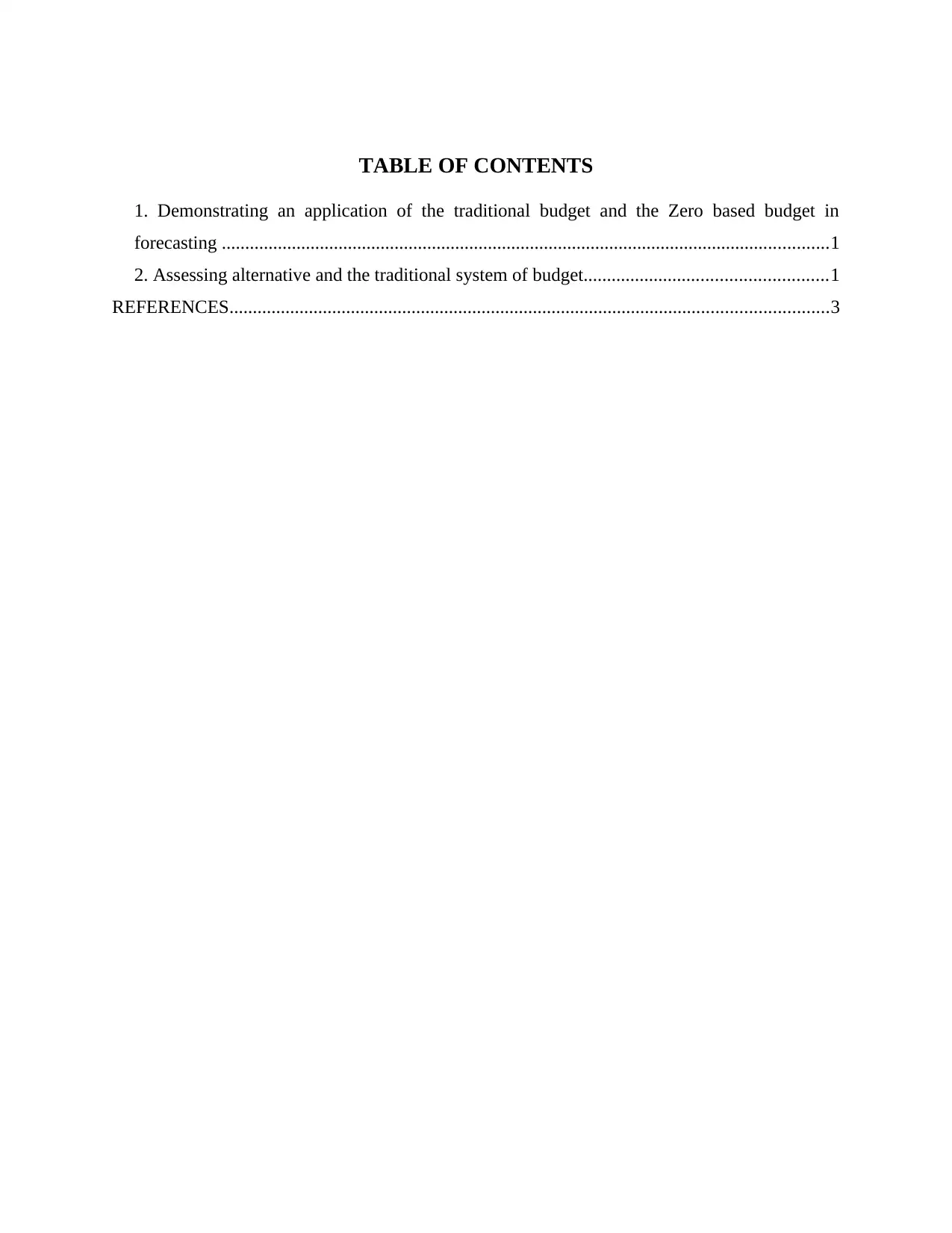
TABLE OF CONTENTS
1. Demonstrating an application of the traditional budget and the Zero based budget in
forecasting ..................................................................................................................................1
2. Assessing alternative and the traditional system of budget....................................................1
REFERENCES................................................................................................................................3
1. Demonstrating an application of the traditional budget and the Zero based budget in
forecasting ..................................................................................................................................1
2. Assessing alternative and the traditional system of budget....................................................1
REFERENCES................................................................................................................................3
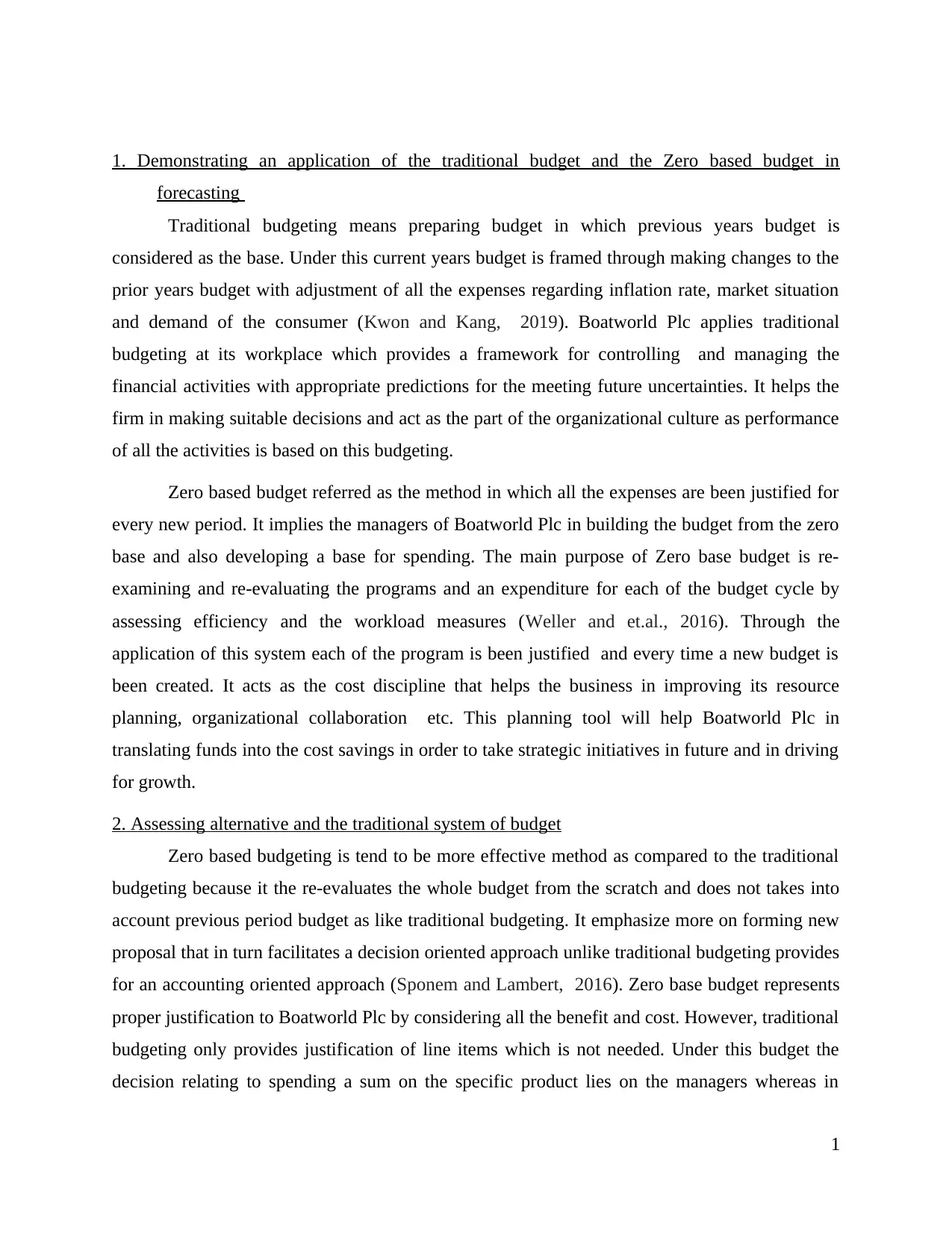
1. Demonstrating an application of the traditional budget and the Zero based budget in
forecasting
Traditional budgeting means preparing budget in which previous years budget is
considered as the base. Under this current years budget is framed through making changes to the
prior years budget with adjustment of all the expenses regarding inflation rate, market situation
and demand of the consumer (Kwon and Kang, 2019). Boatworld Plc applies traditional
budgeting at its workplace which provides a framework for controlling and managing the
financial activities with appropriate predictions for the meeting future uncertainties. It helps the
firm in making suitable decisions and act as the part of the organizational culture as performance
of all the activities is based on this budgeting.
Zero based budget referred as the method in which all the expenses are been justified for
every new period. It implies the managers of Boatworld Plc in building the budget from the zero
base and also developing a base for spending. The main purpose of Zero base budget is re-
examining and re-evaluating the programs and an expenditure for each of the budget cycle by
assessing efficiency and the workload measures (Weller and et.al., 2016). Through the
application of this system each of the program is been justified and every time a new budget is
been created. It acts as the cost discipline that helps the business in improving its resource
planning, organizational collaboration etc. This planning tool will help Boatworld Plc in
translating funds into the cost savings in order to take strategic initiatives in future and in driving
for growth.
2. Assessing alternative and the traditional system of budget
Zero based budgeting is tend to be more effective method as compared to the traditional
budgeting because it the re-evaluates the whole budget from the scratch and does not takes into
account previous period budget as like traditional budgeting. It emphasize more on forming new
proposal that in turn facilitates a decision oriented approach unlike traditional budgeting provides
for an accounting oriented approach (Sponem and Lambert, 2016). Zero base budget represents
proper justification to Boatworld Plc by considering all the benefit and cost. However, traditional
budgeting only provides justification of line items which is not needed. Under this budget the
decision relating to spending a sum on the specific product lies on the managers whereas in
1
forecasting
Traditional budgeting means preparing budget in which previous years budget is
considered as the base. Under this current years budget is framed through making changes to the
prior years budget with adjustment of all the expenses regarding inflation rate, market situation
and demand of the consumer (Kwon and Kang, 2019). Boatworld Plc applies traditional
budgeting at its workplace which provides a framework for controlling and managing the
financial activities with appropriate predictions for the meeting future uncertainties. It helps the
firm in making suitable decisions and act as the part of the organizational culture as performance
of all the activities is based on this budgeting.
Zero based budget referred as the method in which all the expenses are been justified for
every new period. It implies the managers of Boatworld Plc in building the budget from the zero
base and also developing a base for spending. The main purpose of Zero base budget is re-
examining and re-evaluating the programs and an expenditure for each of the budget cycle by
assessing efficiency and the workload measures (Weller and et.al., 2016). Through the
application of this system each of the program is been justified and every time a new budget is
been created. It acts as the cost discipline that helps the business in improving its resource
planning, organizational collaboration etc. This planning tool will help Boatworld Plc in
translating funds into the cost savings in order to take strategic initiatives in future and in driving
for growth.
2. Assessing alternative and the traditional system of budget
Zero based budgeting is tend to be more effective method as compared to the traditional
budgeting because it the re-evaluates the whole budget from the scratch and does not takes into
account previous period budget as like traditional budgeting. It emphasize more on forming new
proposal that in turn facilitates a decision oriented approach unlike traditional budgeting provides
for an accounting oriented approach (Sponem and Lambert, 2016). Zero base budget represents
proper justification to Boatworld Plc by considering all the benefit and cost. However, traditional
budgeting only provides justification of line items which is not needed. Under this budget the
decision relating to spending a sum on the specific product lies on the managers whereas in
1
⊘ This is a preview!⊘
Do you want full access?
Subscribe today to unlock all pages.

Trusted by 1+ million students worldwide
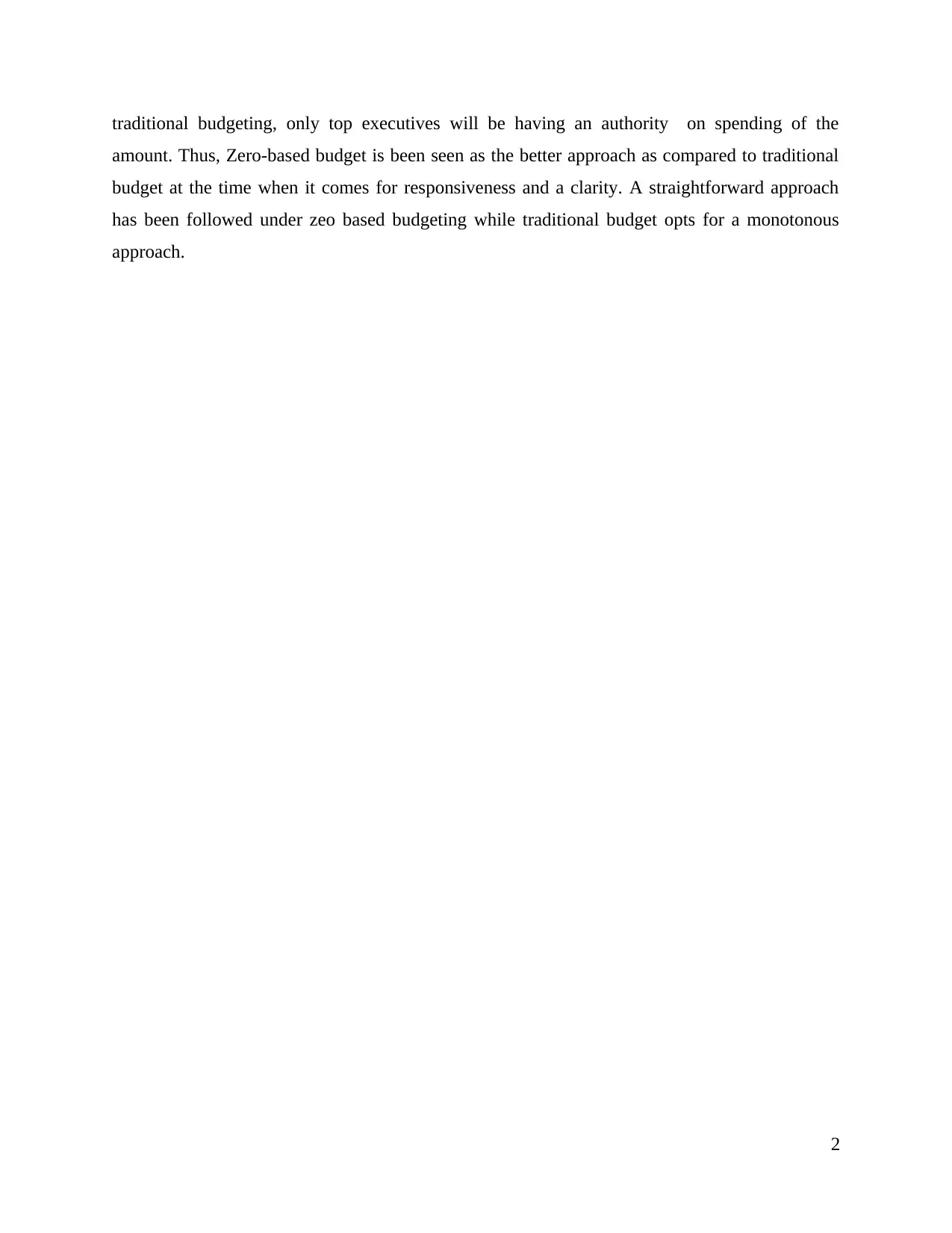
traditional budgeting, only top executives will be having an authority on spending of the
amount. Thus, Zero-based budget is been seen as the better approach as compared to traditional
budget at the time when it comes for responsiveness and a clarity. A straightforward approach
has been followed under zeo based budgeting while traditional budget opts for a monotonous
approach.
2
amount. Thus, Zero-based budget is been seen as the better approach as compared to traditional
budget at the time when it comes for responsiveness and a clarity. A straightforward approach
has been followed under zeo based budgeting while traditional budget opts for a monotonous
approach.
2
Paraphrase This Document
Need a fresh take? Get an instant paraphrase of this document with our AI Paraphraser
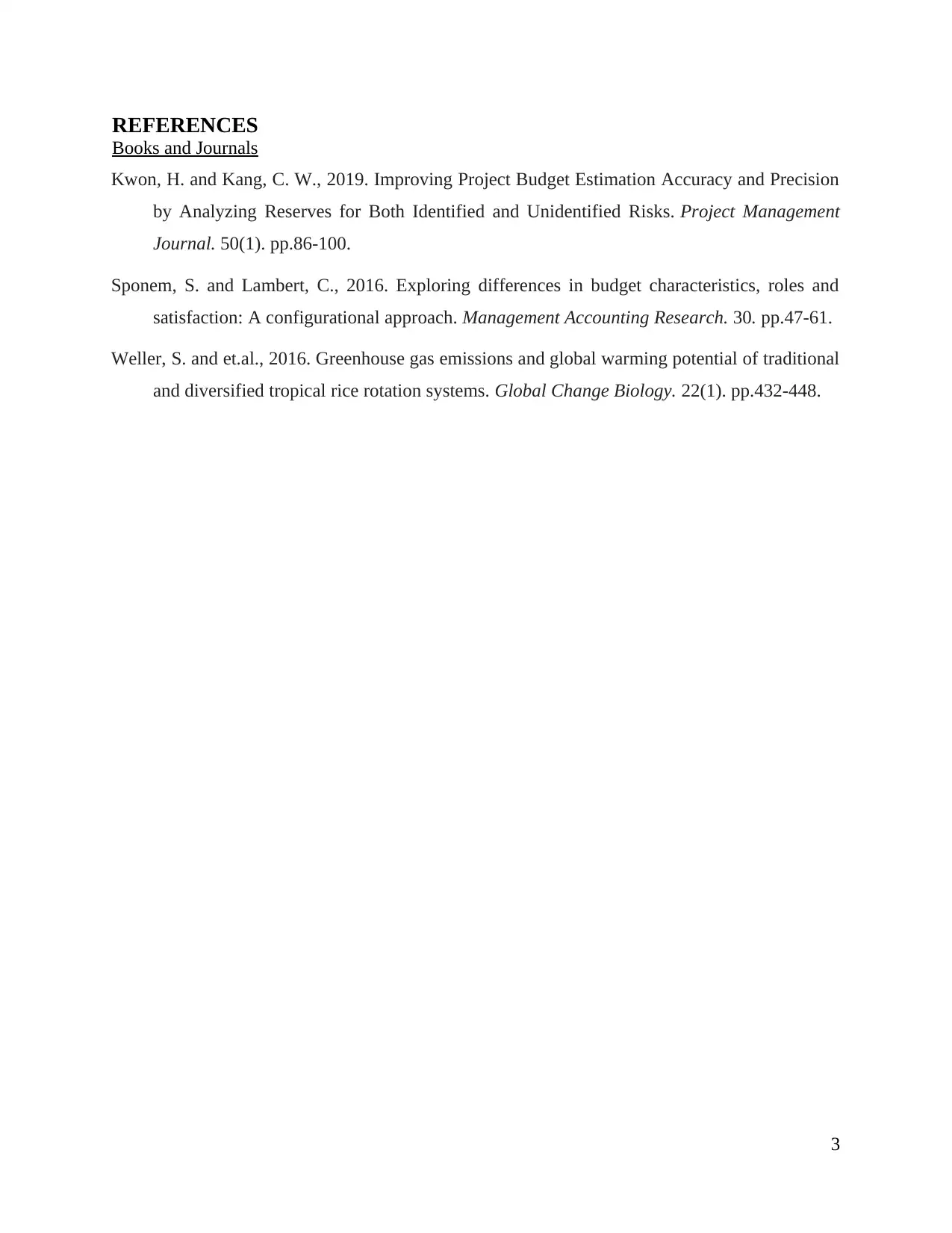
REFERENCES
Books and Journals
Kwon, H. and Kang, C. W., 2019. Improving Project Budget Estimation Accuracy and Precision
by Analyzing Reserves for Both Identified and Unidentified Risks. Project Management
Journal. 50(1). pp.86-100.
Sponem, S. and Lambert, C., 2016. Exploring differences in budget characteristics, roles and
satisfaction: A configurational approach. Management Accounting Research. 30. pp.47-61.
Weller, S. and et.al., 2016. Greenhouse gas emissions and global warming potential of traditional
and diversified tropical rice rotation systems. Global Change Biology. 22(1). pp.432-448.
3
Books and Journals
Kwon, H. and Kang, C. W., 2019. Improving Project Budget Estimation Accuracy and Precision
by Analyzing Reserves for Both Identified and Unidentified Risks. Project Management
Journal. 50(1). pp.86-100.
Sponem, S. and Lambert, C., 2016. Exploring differences in budget characteristics, roles and
satisfaction: A configurational approach. Management Accounting Research. 30. pp.47-61.
Weller, S. and et.al., 2016. Greenhouse gas emissions and global warming potential of traditional
and diversified tropical rice rotation systems. Global Change Biology. 22(1). pp.432-448.
3
1 out of 5
Related Documents
Your All-in-One AI-Powered Toolkit for Academic Success.
+13062052269
info@desklib.com
Available 24*7 on WhatsApp / Email
![[object Object]](/_next/static/media/star-bottom.7253800d.svg)
Unlock your academic potential
Copyright © 2020–2026 A2Z Services. All Rights Reserved. Developed and managed by ZUCOL.




